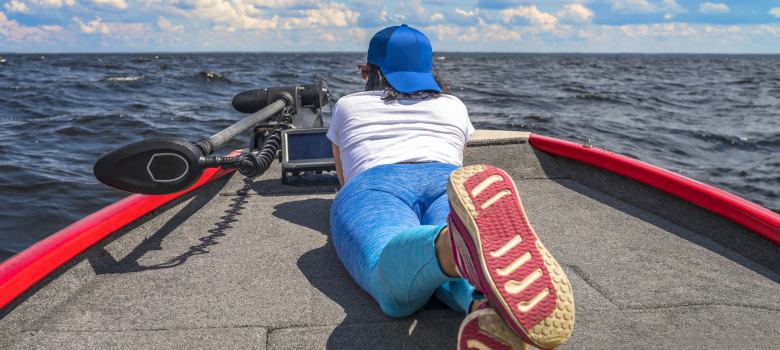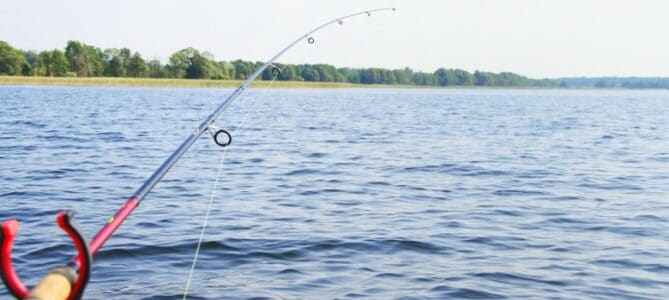If you buy via a link on this page, we may receive a commission, at no extra cost to you.Learn more
Fish finders are superb gadgets to have around. It will help you to catch fish, estimate how deep they are, and understand the layout under the surface.
Since they rely on waves to map the depths, many people wonder if the sound waves affect fish in any way. Therefore, we are going to dedicate today’s piece to answering one simple question. Can fish finders really scare fish away? Nope. The ultrasonic waves fish finders produce will not scare fish, nor will harm them. You can rest assured now.
I know. You are thinking, how can it be possible? Stay with us to find the logic behind it as well as other things that scare fish!
A Word About Fish Finders
Before talking about the reasons why fish finders do not affect fish, it is important to understand what a fish finder is.
A fish finder is a device that uses ultrasonic waves to map what’s beneath the surface. These waves travel from the transducer and bounce off objects such as fish. It comprises two parts, the display, and the transducer.

The transducer is the part of the fish finder responsible for producing these sound waves. Typically it will be flushed into the deck if you have a boat. Other times people throw it off the side.
Does Noise Scare Fish Away?
To understand why your transducer will not scare fish, we will explain why sounds, in general, seldom do first. The difference in densities between the air and the water is the name of the game.
Even though sound waves travel far and wide in the water, the sound won’t scare fish if it comes from above the surface. In other words, fish won’t even notice as long as the origin of the sound is above the surface.
This happens because water is denser than air. Therefore, the sound waves will hit the water’s surface, lowering both the intensity and reach. We experience this phenomenon when our heads are below the surface and hear muffled voices.
I know. You might be thinking. Wait, doesn’t the transducer go beneath the surface? Yes. They do, which brings us to the second reason.
Why Transducers Don’t Scare Fish?
Let’s assume that the sound occurs beneath the water. There should not be a problem as long as the sound is low. Since most fish finders operate below 300 kHz, the waves won’t disturb fish as they are unable to hear them. In fact, you won’t even hear the transducer if you turn it on outside the water.
On the other hand, the low power output of the device means that fish won’t perceive the electric pulses. This includes fish that are sensitive to electricity and electromagnetic waves.
Truth be told, you have more chances of scaring fish by paddling around on your kayak or canoe. The same goes for trolling engines. A tiny fish finder won’t make any difference here.
What About Transducers With Double Frequencies?
The same principles apply. There is nothing to worry about since either frequency works below 300 kHz. So, there is no need to change and work at a lower frequency. In short, there is no need to get a fish finder with a low frequency or with a single channel.
In short, you will be fine as long as you are not using military-grade sonar. For example, sonar used by the Navy to detect submarines does affect fish. Nevertheless, military-grade transducers work at a higher frequency and power output.
Does Sonar Affect Fish?
Now we know that fish won’t be scared by fish finders. But, do the sound waves affect them? In other words, does the transducer hurt fish?
Nope. Since fish finders use low-frequency ultrasound waves, it won’t affect marine life. Trolling engines and ship motors are the biggest threat in terms of sound pollution. So yes, using fish finders is safe for both you and the fish. Besides, think about it for a moment. Will companies such as Garmin produce fish finders if they were not safe? Or if they actually scare fish instead of helping you to get them?
What Sounds Scare Fish?
Now, we don’t want to mislead you into thinking that fish is somewhat deaf. They are not. Nevertheless, the sound has to originate beneath the water. Plus, it has to be loud enough for fish to perceive it. For example, dropping tools right into the deck will definitely scare fish.
Trolling engines, explosions, and similar sounds will surely scare fish away. We’ve extensively talked about which sounds do and don’t scare them. Make sure to check our findings here. You will know what you can and can’t do once you’ve read it.
Fish Finders In Shallow Water
The results will be the same regardless of how deep or shallow the water is. The intensity is what matters here. In short, it is safe to use the fish finder in both shallow and deep water.
But don’t take our word for granted. Click here and check out this awesome video. It shows real-time footage of fish reacting to a fish finder being introduced into their habitat. Yeah, I know, they are in a fishbowl. But you will get the same result in the wild.
Fish Finder and Fish: Does It Affect Them?
Fish finders are increasingly popular. Most anglers own one, not only because they help you to locate fish. But you can also share and store your favorite fishing spots. However, could they be scaring your next catch?
Rest assured. It won’t. Fish finders work with low frequencies and with low power output. Consequently, fish will be unable to hear the ultrasonic sound waves. Similarly, it won’t disrupt nor affect the maritime environment in any way. The only way you can scare fish by using a fish finder is to slap the surface with the transducer time and again. But who does that?
This doesn’t mean that fish can’t hear anything. But you should be fine as long as you are not blasting the water. For anything else, read here.





Great stuff right here. I recently got a fish finder and I wonder if it was safe to use and if it will do more harm than good.